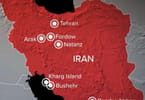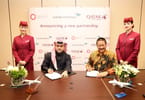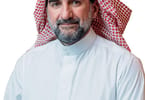Turkey is best-positioned to play the role of a focal marketplace for the region’s vast reserves of oil and gas and so create a much-needed, price-setting hub, energy experts agreed at the World Economic Forum’s Special Meeting on Unlocking Resources for Regional Development, taking place in Istanbul on September 28-29.
A serious problem with the Middle East energy market – unlike those in the United States and Europe – is that it has no transparent pricing mechanism, Majid Jafar, Chief Executive Officer, Crescent Petroleum, UAE, told the meeting. The result was that important energy deals are held up. As both a big, growing energy market and potentially a key energy hub, Jafar said, Turkey could “go one step further” and become a price-setting centre. “That could really bring on much more supply from Middle East resources, which would not only meet Turkish needs, but go on to meet European needs as well,” added Jafar.
The view was echoed by Taner Yildiz, Minister of Energy and Natural Resources of Turkey. Yildiz underscored Turkey’s suitability as a hub because it offers both political stability and large oil-handling capacity. The main barrier was instability in the region, and its long-term impact, he said. “Let’s say you have instability for six months, the impact is not for six months, but for much longer. Crude oil and natural gas are very important inputs and many people unfortunately believe that they are reasons for war.”
Fatih Birol, Chief Economist, International Energy Agency, Paris, told the meeting that some two-thirds of global oil and gas reserves are in the Middle East region; but it was crucial to realize that it was all underground. “In order to bring this oil and gas from under the ground, you have to make investments. And if the investors are scared and uncertain about stability in the region, they do not invest. Instability in Libya and the rise of ISIS scares investors; my main worry is not for today only, but for the next few years, because if there is no investment made now and if production doesn’t meet strongly growing energy demand in Asia and elsewhere, who is going to meet that demand growth?”
Uncertainty surrounded the role of Iran as a major energy producer in the region, Kamel Bennaceur, Minister of Industry, Energy and Mines of Tunisia, said. Production in the country was complex both above and below ground – there were difficult political considerations involving the nation’s nuclear ambitions and resulting international sanctions, and production itself was technically challenging. Technology to exploit Iran’s resources had to come from outside through partnerships with oil and gas companies, and sanctions made this difficult.
Even so, Iran may have more gas that even Russia, Jafar added, agreeing that the problem was investment. “The challenge in Iran is that the constitution prohibits private investment in the way the sector knows it worldwide, so you can only have service contracts with limited profit potential,” he said.
“There is real need for massive investment in the country, but, even if the sanctions are lifted, there won’t suddenly be millions of barrels of oil coming onto the market the way some media are presenting it. It would take time”, Jafar said.
The experts agreed renewables would play an increasing role in the global energy sector. Bennaceur described a strengthening renewable sector in Tunisia, focusing on wind and solar. Production was intended for both domestic consumption and export, notably to Italy, he said. However, insisted Jafar , while renewables were an important part of the energy mix, the transition away from fossil fuels would be a gradual one. “Oil and gas will continue to meet 80%-plus of the world’s energy needs for decades to come.”
Yildiz added that Turkey continued to invest in renewables, but its nuclear power programme remained essential to meet the country’s energy needs. “You can’t have a shrinking energy sector and a growing economy.” Nuclear power would allow the country to diversify resources and this was a sustainable policy, he said. Turkey already produced more energy from renewables than the average of the 28 countries of the EU, he added.
Notes to Editors
For more information about the meeting, please visit the Forum’s website at http://wef.ch/eume14
View the best photographs from the Special Meeting on Flickr at http://wef.ch/eume14pix
Watch live webcasts of sessions at http://wef.ch/live
Watch sessions on demand on YouTube at http://wef.ch/youtube
Become a fan of the Forum on Facebook at http://wef.ch/facebook
Follow the Forum on Google+ at http://wef.ch/gplus
Follow the Forum on Twitter at http://wef.ch/twitter and http://wef.ch/livetweet (hashtag #WEF)
Read the Forum blog at http://wef.ch/blog
Follow the Forum on Instagram at http://wef.ch/instagram
Upcoming Forum events at http://wef.ch/events
The Forum Media App is available here http://wef.ch/publicapps
The World Economic Forum is an international institution committed to improving the state of the world through public-private cooperation in the spirit of global citizenship. It engages with business, political, academic and other leaders of society to shape global, regional and industry agendas.
Incorporated as a not-for-profit foundation in 1971 and headquartered in Geneva, Switzerland, the Forum is independent, impartial and not tied to any interests. It cooperates closely with all leading international organizations (www.weforum.org).
WHAT TO TAKE AWAY FROM THIS ARTICLE:
- Turkey is best-positioned to play the role of a focal marketplace for the region's vast reserves of oil and gas and so create a much-needed, price-setting hub, energy experts agreed at the World Economic Forum's Special Meeting on Unlocking Resources for Regional Development, taking place in Istanbul on September 28-29.
- “There is real need for massive investment in the country, but, even if the sanctions are lifted, there won't suddenly be millions of barrels of oil coming onto the market the way some media are presenting it.
- “The challenge in Iran is that the constitution prohibits private investment in the way the sector knows it worldwide, so you can only have service contracts with limited profit potential,” he said.






















